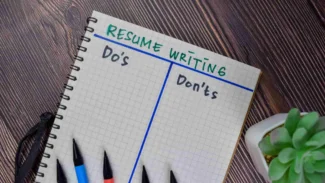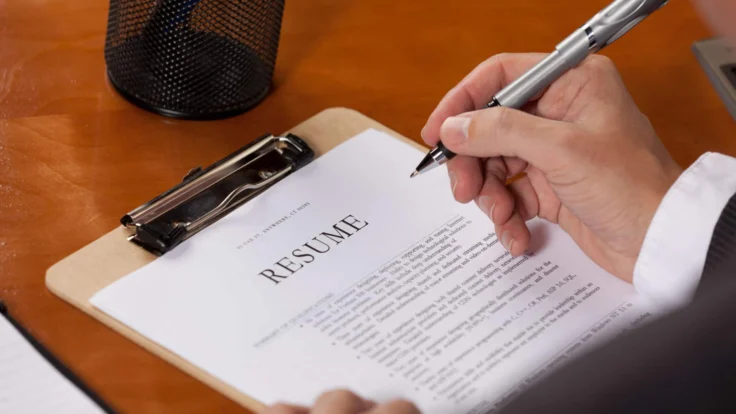One of the biggest mistakes that prospective candidates make in a job search is making their resume too generic. Whilst using the same resume for dozens of job applications may seem more time-efficient, you’ll see very few results. This can be demoralizing and discouraging.
There’s a very simple solution to avoid this: You need to tailor your resume for the job you’re applying for.
Adjusting your resume for each job may reduce the quantity of applications you send out. However, the quality of your document and the subsequent responses will be much better.
In the following guide, we’ll explain how to tailor your resume to any job you want. You’ll learn how to expertly and professionally select the information you include, with the goal of getting more interviews. Let’s get started.
Why It’s Important To Target Your Resume to a Specific Job
Recruiters want to see the criteria they’re advertising for fulfilled. Aligning the skills and experience on your resume with the criteria increases your chances of being considered for the role.
In most cases, the recruiters will be asking themselves the following questions:
- Is your experience relevant to the advertised position?
- Do you show evidence of achieving goals in your previous roles?
- Do you have the licenses or other qualifications required for the position?
- Are you a good fit for the company culture, mission, and values?
- Are there any unexplained employment gaps or frequent job changes?
Tailored resumes don’t list every skill and duty you’ve ever had. Instead, they zero in on the exact skills and competencies recruiters are looking for in a specific position.
💡Tip
Resume Coach’s AI-powered online resume generator can help you identify the most relevant skills in your industry. You can also use it to tweak your existing resume to better fit each job you apply for.
How To Analyze the Job Description
When you find an interesting position advertised, you’re given more than just the company name and job title. You’ll also see a job description. This is usually a few paragraphs in length, but it can be much longer.
Job descriptions tell you everything you need to know to decide whether to apply for the job. Take note of any potential resume keywords. Make a list or highlight them as you see them in the job description.
-
💡 Our expert’s advice

You should also consider hidden or implicit job requirements. Some skills or qualities are not stated outright in the job description. You can search for similar roles online and note the common skills required.
Keywords might include:
- Minimum education requirements
- Specific skills
- Years of experience
- Certifications or licenses
- Tools or computer programs you’ve used
After you’ve noted resume keywords, include as many as you honestly can in your resume and cover letter.
Often, before your application even reaches the recruiter, a computerized applicant tracking system (ATS) will make sure your resume includes the job’s basic requirements.
-
💡 Our expert’s advice

Create a table to track which keywords you have included in your resume. There are “must-have” and preferred skills, certifications, and experience you must have to advance to the next stage in the application process.
Research the values of the company
Tailoring your resume doesn’t stop at keywords. It is also useful to be aware of the company’s values. Sometimes this requires a little research.
You may need to look for a mission statement on the company’s website or follow the brand on social media. What you learn can guide you when modifying your resume. LinkedIn has a wealth of information about the company.
For example, you might learn that a company has a culture of continuous learning or eco-friendly sustainability. When you can display similar values on your resume, the hiring manager may see that you’re a good fit with the company culture.
-
💡 Our expert’s advice

When researching the company’s values, look for terms such as “collaborative” and any references to advancement, mentorship, or leadership expectations.
How To Customize Your Resume
Above, we discussed how to find the right keywords for your resume. But how can you put that information to use?
Maybe you’ve already added keywords from the job description to your resume. That’s great! But you need to take things a step further: prioritize the most important skills and refine your skills list and job descriptions.
This might involve emphasizing certain key skills over others. For example, when listing your previous experience, you might highlight skills mentioned directly in the job description.
If “leadership,” “communication,” and “problem-solving” are keywords, that might look something like this:
Example
Original: Managed a team of customer service agents and handled client inquiries.
Improved: Led a customer service team, enhancing performance through effective communication and collaboration; solved client problems to enhance satisfaction rates by 14%.
Remember that the most essential “real estate” is the top one-third of your resume. Include keywords to optimize your professional statement. Rearrange the order of resume sections so that the most important information will be seen first.
Give clear evidence of your suitability
Recruiters don’t want to take your word for it. Simply saying “I’m skilled in X, Y, and Z” might not be enough. You need to give clear evidence of your suitability for the position. How?
You can do this by providing data and specific examples instead of general statements. Data might include things like how much money you saved, how many customers you helped, quality improvements you made, time saved, project impact, or how satisfaction rates or sales increased.
Pair these with examples that show what you did and what you achieved. This is crucial in sections like your professional statement. Data can catch the recruiter’s eye and prove you’re a good fit for the job right away.
Example
Original: Experienced marketing specialist focused on improving brand visibility.
Updated: Boosted brand visibility by 40% as measured by digital reach and engagement, by executing targeted campaigns and strategic partnerships.
-
💡 Our expert’s advice

Use this formula for maximum impact:
- Accomplished [X] as measured by [Y], by doing [Z].
Always start the sentence with a strong verb.
Use keywords effectively
When tailoring your resume for a single job, the keywords you use matter more than ever. Catching the recruiter’s eye is much easier with industry-specific phrases and vocabulary.
For example, when applying for a sales position, your most important keywords will be related to performance and results. They may include terms like sales targets, revenue growth, lead generation, and client acquisition.
But if you’re interested in a project engineer position, your keywords will center around qualifications and specific skills. These might include PMP, AutoCAD, project management, Professional Engineer (PE), AWS certification, Six Sigma, and quality standards.
💡Tip
If you’re not sure if you’re hitting the mark, use an industry-specific keyword list or take advantage of our AI-powered skills generator. Just put in your desired position and industry to get started.
Because your resume should only be one to two pages in length, you must make every keyword count. Strategically select the most important keywords based on the job description.
You may even need to remove some content that is not relevant to the current position. Doing so could make the difference between whether your resume is read by a human recruiter or not.
As mentioned above, most companies use applicant tracking software to filter out documents that don’t show much promise. The keywords from the job description are used to train the ATS, so using them is vital.
Top Tips for Creating a Job-Specific Resume
Does tailoring your resume really make a difference? According to CareerBuilder, 22% of candidates report that updating their resume actually prevents them from applying to jobs they’re interested in.
A tailored resume takes a little more work, but it can dramatically increase your chances of being noticed and called in for an interview.
When you’re competing against hundreds of other candidates for a single role, specificity signals value. It shows the hiring manager that you understand not only what they do, but also what they need.
Be sure to showcase your most relevant skill or experience in one to two sentences that a hiring manager can easily scan.
To recap, here’s how to tailor your resume effectively:
- Study the job description. Identify skills, tools, experience, and values that the employer emphasizes.
- Use strategic keywords. Add the most important phrases directly into your professional summary, skills list, and experience section.
- Prioritize relevant content first. Place it in the top one-third of your resume.
- Mirror the company’s values. Show that you have cultural alignment, not just qualifications.
- Give proof, not just promises. Use measurable results and specific examples as evidence. Avoid vague, generalized statements.
- Remove distractions. Cut any experience that doesn’t qualify you for this specific job opportunity.
Don’t forget the importance of proofreading before submission. Misspelled words and other mistakes can steal away the confidence you’ve worked so hard to build.
Also, be careful to send the right version of your resume when you’re applying to multiple jobs–a resume tailored to a different company won’t help you much. Consider naming your saved file with the company it’s intended for, and include your first and last name when saving.
Our resume builder tools take the tedium out of matching your resume to the job. You can quickly and easily edit your existing resume to highlight the right keywords.
When you tailor your resume in this way, you’re no longer just applying to jobs. You’re positioning yourself as the solution your next employer is looking for.
Related Blogs





